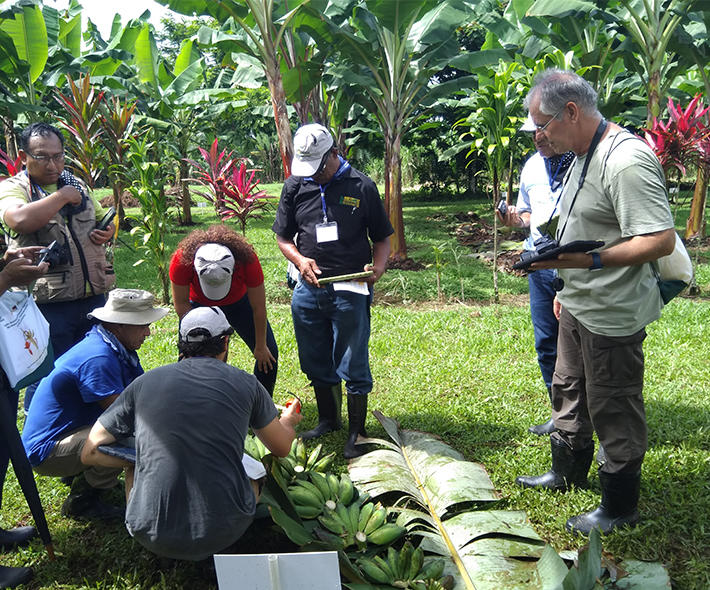Sharing best practices for banana germplasm conservation and exchange

Latin American and Caribbean banana collection curators came together for the MusaNet Regional Workshop on Musa Characterization and Documentation
Banana (Musa) diversity is conserved in more than 60 ex situ collections worldwide located mostly in banana producing countries. To ensure the long-term conservation on a cooperative basis, and facilitating the increased use of banana genetic resources, Bioversity International – through the Global Musa Genetic Resource Network, MusaNet – organizes a series of activities.
The most recent was a Latin American and Caribbean (LAC) Regional Workshop on Musa characterization and documentation, held in Costa Rica from 12–17 November 2018. The workshop was hosted by our partner Corporación Bananera Nacional of Costa Rica (CORBANA) at their research station and field collection in Guápiles.
It was the fourth in a series of regional MusaNet workshops covering the four banana regional networks: Innovate Plantain, BARNESA, BAPNET and MusaLAC. These workshops have allowed national collection curators, many of whom had never met before, to share their knowledge and experiences in best practices for banana germplasm conservation and exchange, disease prevention and management and field management of their collections. The opportunity to share the top ten most popular banana varieties in each country was also very valuable, as this information could be important for future evaluation studies and trials in the region.

This time, 14 curators from the LAC region were joined by experts and staff from CORBANA and Bioversity International. Together they forged a standard methodology for their collections using hand-held tablets to easily and quickly characterize and identify banana accessions in the field. Over three mornings, a practical exercise of characterizing four representative accessions was carried out on tablets with the new application MusaTab. Another application developed in partnership with CIRAD, MusaID, was introduced to help identify accessions based on a probability matrix of characterization data. Both applications were met with great enthusiasm for their efficiency and user-friendliness.
Sessions on the optimal management of accession data using the Musa Germplasm Information System (MGIS) focused on the new features available to the public, as well as the treasure trove of passport data available from collections across the globe. Important points on data protection and rights through Data Sharing Agreements with Bioversity International were also made, and all collections at the workshop have now signed the agreement.
CORBANA researchers also shared early screening methods for priority traits such as resistance to nematodes and Black leaf streak, practices on biological control and improving nutrition. Discussions also focused on the prevention of Fusarium Wilt Tropical Race 4, which poses a serious threat to the LAC banana-producing region.
The workshop was funded by GIZ and the CGIAR Research Program on Roots, Tubers and Bananas (RTB) and the Genebanks Platform, which are supported by CGIAR Trust Fund Donors.
